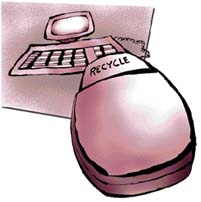Death of a computer
Death of a computer

the us is facing a population explosion of a strange sort. The land of the birth of computers, is today choked with piles of its glorious invention. With no easy disposal method identified as yet, the mountain of obsolete personal computers ( pc s) is increasing everyday.
As the life span of a computer gets shorter, the pile of pc s cast aside for speedier models grows even larger. The rejected old machines inadvertently find their way into landfills, thereby posing a major environmental problem. Old computers can be environmentally hazardous if they are not properly recycled. A pc' s central processing unit contains traces of toxic metals such as mercury and chromium. Monitors contain lead, which is mixed with the glass of the screen to shield users from radiation. All these elements have the potential of polluting the surrounding areas.
"We should find a practical way of handling old computers other than digging a big hole and dumping them in the ground,' says Reid Lifset of Yale University in the us and editor of the Journal of Industrial Ecology . "Indeed what is imminently required is a wide-ranging computer-recycling programme,' he says.
In a report issued in June, the National Security Council of America estimated that only 11 per cent of the pc processors that became obsolete in 1998 were recycled. Another three per cent were resold or donated to someone else. No one knows whether the remaining machines were thrown into landfills. The report predicts that in 2002, nearly three and a half million more pc s will outlive their usefulness. In the absence of proper alternatives for disposing of outdated computers, people like Josh Sobeck, a resident of San Francisco, are at their wits end. Sobeck has relegated two unused Apple machines to his pantry, he does not know what else to do with them. "I have discovered that they are excellent at collecting dust and holding up bags of rice, but other than that, I am at a loss,' he says.
Apparently, Sobeck is not alone. A study undertaken by students of Tufts University at Medford, Massachusetts revealed that almost 76 per cent of the old pc s in the us are lying in disuse. These are staggering figures that call out for immediate steps towards viable solutions. Though a few cities have tried computer-recycling programmes but these have largely been stray cases. One such case was in San Jose, California, where a one-month pilot programme in 1997 netted 972 central processing units ( cpu s), 937 monitors and 413 printers among computer equipment collected at three electronic stores.
But unfortunately, not many have followed the San Jose example. The business of computer recycling is still largely an untouchable proposition. The reason: it is hard to make a profit overhauling outdated pc s, or breaking them down for scrap. Older, commercial computers are still okay for they contain enough gold and silver to make them valuable to recycling firms. But newer, individual models do not have any of these precious metals, says Greg Pitts, director of environmental programmes for the us -based Microelectronic and Computer technology Corp. What they have, instead, is a lot of plastic.
Some companies, however, do manage to make profits. But they generally get their pc s from manufacturers and large business firms, which ensure a high volume of consistent supply.
Finding answers One solution may perhaps be more leasing of computers, so pc manufacturers would have a bigger incentive to reuse parts, and better systems for transporting old computers, to bring down recycling costs. Another way to prevent pc s from becoming obsolete is to upgrade them. Upgrading involves a change of the cpu in terms of the ram or the memory being increased according to the latest level. For certain cpu s, a change of motherboard may also be required. For example, in order to upgrade a pc from Pentium II 350 to the latest in the market, the Pentium III, a change of motherboard may be required.
To tackle this problem Intel is now coming out with cpu s containing Socket 370 or Slot (board manufacturers around the world have begun designing boards with both the options). These new additions will make the pc s upgradable for a long time to come, thus making the machines less susceptible to the







